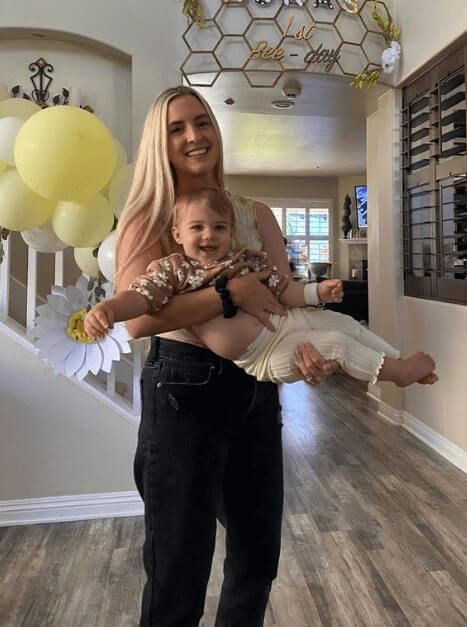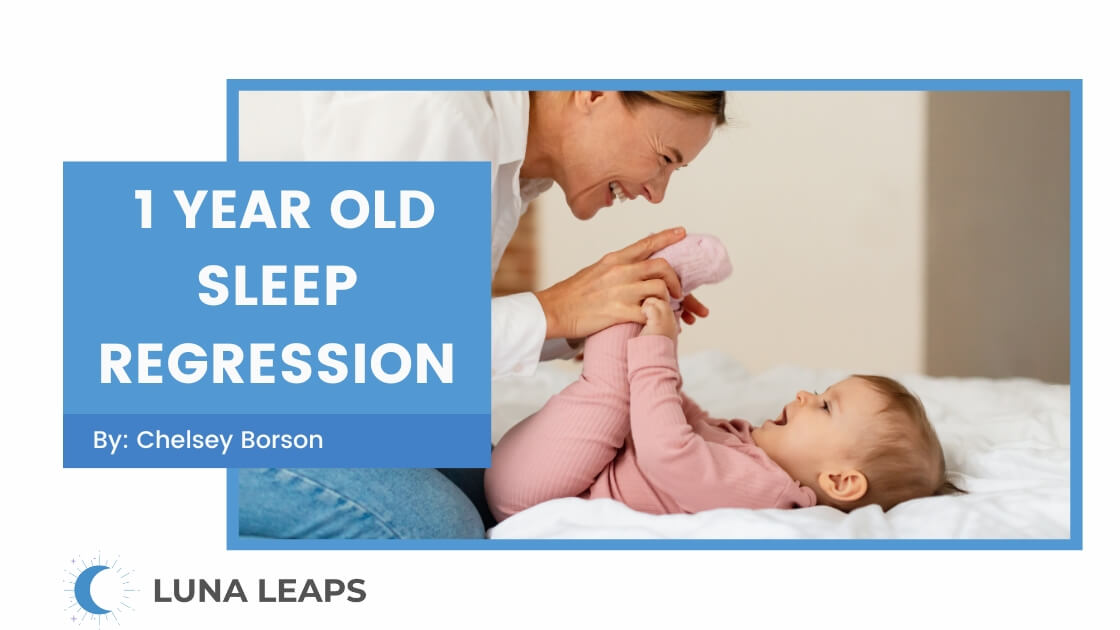Last Updated on September 28, 2023


As your baby approaches their first birthday, you might notice changes in their sleep patterns and wake times compared to earlier months. These changes often trigger concern about the infamous 12-month sleep regression
I'm Chelsey and as a baby sleep consultant and as a fellow mom, I understand the challenges parents face with their children's sleep behavior. If you have a 12-month-old who has suddenly become a fussy sleeper, you've come to the right place! Keep reading as we explore the ins and outs of this regression and how you can support your baby during this time. Contact me for personalize help.
When your 12-month-old enters the realm of sleep regression, several changes may come into play. As an infant grows older, their sleep pattern generally shifts toward longer nighttime sleep periods and continued daytime napping. Although many infants start sleeping through the night around 6 months, this isn't universal.
Around 72% of 12-month-olds may sleep continuously for six or more hours (source), but experiences vary. These sleep fluctuations often accompany significant developmental milestones, including increased emotional engagement, communication, cognitive skills, and physical abilities.
These changes can affect both daytime activity and nighttime sleep, contributing to disrupted sleep patterns and sudden awakenings. The best preparation for this transition into toddlerhood is parental readiness to promptly address potential sleep challenges.
The 12-month sleep regression can be attributed to various factors that affect a child's sleep patterns and behaviors.
Firstly, separation anxiety often peaks around this age, leading to increased nighttime awakenings as babies become more aware of their surroundings and the absence of their caregivers.
Secondly, the development of new skills like standing and walking can disrupt sleep as infants practice these abilities, both in the crib and during daytime naps.
Additionally, changes in sleep routines or nap transitions can contribute to sleep problems.
Regardless of the specific reason for your 12-month-old's sleep regression, it's essential to closely monitor their sleep health. These disturbances can serve as early warning signs, and addressing them promptly with age-appropriate sleep strategies can help ensure a smoother transition through this regression.
The length of the 12-month sleep regression can vary among infants, but a common duration in most cases is typically up to a few weeks, more or less.
Scientific studies have highlighted that many babies experience disruptions in their sleep patterns and behaviors around this age. These disturbances may include nighttime awakenings, changes in bedtime routine, and difficulties in maintaining a stable routine.
It's essential to recognize that while sleep regression is a common phase, every child is unique, and the duration can differ.
To ensure your child's sleep health, it's advisable to consult with a baby sleep coach. They can assess your baby's specific situation and guide you on creating and maintaining healthy sleep routines.
When it comes to improving your baby's sleep during their first year, especially during the 12-month sleep regression, several tips can help both your little one and you.
Ensure that your child is getting enough sleep.
Stick to age-appropriate sleep needs and wake windows to establish healthy sleep habits.
Implement a consistent bedtime routine. This can significantly aid your child in falling asleep more easily.
Provide comfort and reassurance if your child is experiencing separation anxiety.
Near their first birthday, many babies go through varying levels of sleep development. If you find your baby' sleep patterns to be unusual or suspect they are facing one-year sleep regression, some questions may pop into your head that need clarification. Here are some frequently asked questions to provide you with valuable insight.
Not all 12-month-old babies will experience sleep regression, but it's not uncommon. Child sleep patterns vary, and some may encounter changes.
Factors such as a consistent sleep schedule, night sleep, and wake windows play crucial roles. Short naps and daytime sleep disturbances can sometimes indicate sleep regression as well.
If your 12-month-old is experiencing sleep issues, working with a Los Angeles baby sleep coach can provide valuable guidance and solutions tailored to your child's specific needs.
Recovery from 12-month sleep regression can vary among infants. Toddler sleep patterns and other individual factors play a significant role. Research shows that while some babies may recover quickly, others may take more time. It's essential to be patient and use effective sleep training methods to help your little one achieve better sleep.
Yes, parents can prepare for their 12-month-old's sleep regression. Begin by establishing a consistent sleep routine. Make adjustments such as extending wake windows and helping your baby learn to self-soothe and fall asleep independently.
Following the guidance of reputable sources like the Sleep Foundation can be immensely beneficial. Remember, while preparation helps, a Los Angeles Baby Sleep Coach can provide tailored support for smoother sleep transitions.
You can also contact me at Luna Leaps to better help you prepare for sleep issues.
No, a 12-month sleep regression is not preventable, but its impact can be lessened. While fighting naps and frequent wakings can be common during this phase, maintaining a consistent sleep schedule (found in 10 month, 11 month and 12 month sleep schedules) and extending wake windows can help improve your child's sleep patterns.
Yes, sleep training can be implemented during the 12-month sleep regression. Starting with a well-structured 12-month-old sleep schedule can be a beneficial foundation for sleep training. Consistency in naptime routines and addressing shorter naps can also contribute to better sleep habits. Scientific studies support the efficacy of sleep training methods in improving babies' sleep patterns.
No, not all 12-month-olds will experience sleep regression. While most sleep regressions can be attributed to various developmental factors, it's important to note that each baby is unique. Some may continue with their established sleep patterns without major disruptions, while others might experience occasional difficulties falling asleep.
If you observe persistent sleep disturbances or concerns about your baby's sleep, getting support from a baby sleep specialist is recommended. They can provide tailored solutions to address specific sleep-related issues and ensure your baby's sleep remains on a healthy track.
Several factors can contribute to a 12-month-old baby's sleep disturbances. First, developmental milestones, such as learning to walk or talk, can lead to increased nighttime awakenings. Secondly, separation anxiety may cause babies to wake up suddenly. Lastly, inconsistent sleep routines or a lack of a stable sleep schedule (see a 13 month old sleep schedule as an example) can disrupt their nighttime sleep.
While these sleep challenges can be worrisome for parents, it's essential to remember that they are common at this age.
Signs of a 12-month sleep regression can manifest in various ways. Increased nighttime wakings, a sudden refusal to sleep during naptime, shorter naps, and restlessness during the night are common indications. Babies may also become more fussy or irritable when bedtime approaches.
It's crucial for parents to pay attention to these signs, as they may signal a sleep regression. If you notice one or more of these symptoms in your child, don't hesitate to reach out to a sleep specialist for assistance. Early intervention can help address sleep challenges and restore better sleep for everyone.
Contact me to find out how we can help your little one sleep better today!

Hi, I'm the founder of Luna Leaps. As a certified sleep consultant with the Institute of Pediatric Sleep and Parenting, I bring expertise and compassion to helping families establish healthy sleep habits. As a mom of two, including one with special needs, I understand the struggles of sleepless nights and the toll it can take on the whole family. But with a personalized plan tailored to your child's unique needs, we can work together to improve sleep and overall well-being. Let's start this journey towards better sleep together.